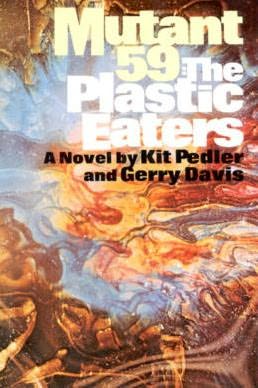Science Fiction
Dictionary
A B C D E F G H I J K L M N O P Q R S T U V W X Y Z
Worms Eat Plastic Now

According to researchers in Spain and England, the larvae of the greater wax moth can efficiently degrade polyethylene, which accounts for 40 percent of plastics.
(Worms eat plastic - the video
The team left 100 wax worms on a commercial polyethylene shopping bag for 12 hours, and the worms consumed and degraded about 92 milligrams, or roughly 3 percent, of it. To confirm that the larvae’s chewing alone was not responsible for the polyethylene breakdown, the researchers ground some grubs into a paste and applied it to plastic films. Fourteen hours later the films had lost 13 percent of their mass—presumably broken down by enzymes from the worms’ stomachs.When inspecting the degraded plastic films, the team also found traces of ethylene glycol, a product of polyethylene breakdown, signaling true biodegradation.
In the 1971 novel Mutant 59: The Plastic Eaters, Gerry Davis and Kit Pedlar wrote about a biological time bomb that could destroy necessary infrastructure.
"On the surface, in the freezing December air, the smell of the rotting plastic began to hang permanently in the air. A cloying, wet, rotting smell similar to the smell of long-dead flesh. It filled streets and homes, basements and factories. Traffic lights failed, causing irresolvable jams.... The breakdown of plastic spread into Broadcasting House.... A gas main with polypropylene seals on its pressure regulators erupted into flame.... Plastic cold-water pipes softened, ballooned, and burst, flooding into shops, homes, and restaurants."Slowly and inexorably, the rate of dissolution increased; failures occurred in increasing succession until, within forty-eight hours, the centre of London had become a freezing chaos without light, heat, or communication."

(Mutant 59: The Plastic Eaters)
Earlier still, Michael Crichton wrote about it in his 1969 novel The Andromeda Strain.
"the organism...Mutated to a noninfectious form. And perhaps it is still mutating. Now it is no longer directly harmful to man, but it eats rubber gaskets.""The airplane."
Hall nodded. "National guardsmen could be on the ground, and not be harmed. But the pilot had his aircraft destroyed because the plastic was dissolved before his eyes."
(Read more about Crichton's plastic-eating bacteria)
Larry Niven also used the idea of an organism that ate material necessary for a civilization's infrastructure: see this note on superconductor-eating bacteria from Niven's 1980 novel The Ringworld Engineers.
I miss Michael Crichton; here is a list of about sixty science fiction in the news stories about Michael Crichton's works.
Via Scientific American. Thanks to Winchell Chung (aka @nyrath) for a reference for this story
Scroll down for more stories in the same category. (Story submitted 5/20/2017)
Follow this kind of news @Technovelgy.| Email | RSS | Blog It | Stumble | del.icio.us | Digg | Reddit |
Would
you like to contribute a story tip?
It's easy:
Get the URL of the story, and the related sf author, and add
it here.
Comment/Join discussion ( 0 )
Related News Stories - (" Biology ")
Black Fungus Blocks Radiation
'You were surrounded by Astrophage most of the time' - Andy Weir, 2021.
Lunar Biorepository Proposed For Cryo-Preservation Of Earth Species
'...there was no one alive who had ever seen them. But they existed in the Life Bank.' - John Varley, 1977.
Let's Make Slaver Sunflowers! Engineering Plants To Reflect Light
'The mirror-blossom was a terrible weapon.' - Larry Niven, 1965.
Machete-Wielding Philodendron Isn't Going To Take It Anymore
'The tree ended its wild larruping, stood like a dreaming giant liable to wake into frenzy at any moment.' - Eric Frank Russell, 1943.
Technovelgy (that's tech-novel-gee!) is devoted to the creative science inventions and ideas of sf authors. Look for the Invention Category that interests you, the Glossary, the Invention Timeline, or see what's New.
Science Fiction
Timeline
1600-1899
1900-1939
1940's 1950's
1960's 1970's
1980's 1990's
2000's 2010's
Current News
The New Habitable Zones Include Asimov's Ribbon Worlds
'...there's a narrow belt where the climate is moderate.'
Can One Robot Do Many Tasks?
'... with the Master-operator all you have to do is push one! A remarkable achievement!'
Atlas Robot Makes Uncomfortable Movements
'Not like me. A T-1000, advanced prototype. A mimetic poly-alloy. Liquid metal.'
Boring Company Drills Asimov's Single Vehicle Tunnels
'It was riddled with holes that were the mouths of tunnels.'
Humanoid Robots Tickle The Ivories
'The massive feet working the pedals, arms and hands flashing and glinting...'
A Remarkable Coincidence
'There is a philosophical problem of some difficulty here...'
Cortex 1 - Today A Warehouse, Tomorrow A Calculator Planet
'There were cubic miles of it, and it glistened like a silvery Christmas tree...'
Perching Ambush Drones
'On the chest of drawers something was perched.'
Leader-Follower Autonomous Vehicle Technology
'Jason had been guiding the caravan of cars as usual...'
Golf Ball Test Robot Wears Them Out
"The robot solemnly hit a ball against the wall, picked it up and teed it, hit it again, over and again...'
Boring Company Vegas Loop Like Asimov Said
'There was a wall ahead... It was riddled with holes that were the mouths of tunnels.'
Rigid Metallic Clothing From Science Fiction To You
'...support the interior human structure against Jupiter’s pull.'
Is The Seattle Ultrasonics C-200 A Heinlein Vibroblade?
'It ain't a vibroblade. It's steel. Messy.'
Roborock Saros Z70 Is A Robot Vacuum With An Arm
'Anything larger than a BB shot it picked up and placed in a tray...'
A Beautiful Visualization Of Compact Food
'The German chemists have discovered how to supply the needed elements in compact, undiluted form...'
Bone-Building Drug Evenity Approved
'Compounds devised by the biochemists for the rapid building of bone...'
